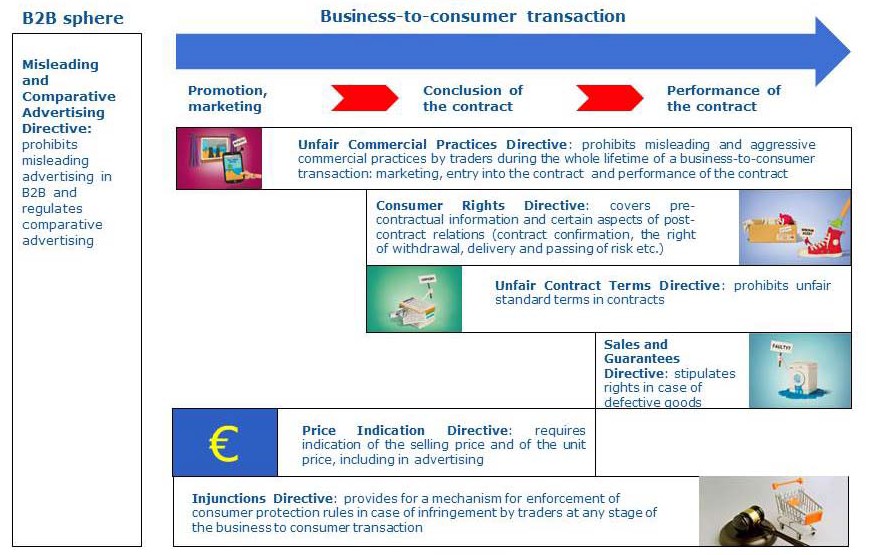European Commission Launches Review of EU Consumer Legislation
Client Alert | 15 min read | 04.04.16
In accordance with its Regulatory Fitness and Performance Program, the European Commission has launched a “Fitness Check” of six major directives in the area of EU consumer law. The goals are to assess the cumulative impact of the directives and their interplay with other related legislative instruments, to avoid excessive regulatory burdens, and to determine whether further legislative action is required at the EU level. The Fitness Check, which is expected to be completed in the second quarter of 2017, will address the directives’ effectiveness, efficiency, coherence, relevance, and added value to the European Union. The Fitness Check will also identify overlaps, gaps, inconsistencies, and obsolete measures that might benefit from further legislative attention.
- Scope
The Fitness Check will cover the following six general EU consumer law directives:
- The Unfair Contract Terms Directive (93/13/EEC).
- The Price Indication Directive (98/6/EC).
- The Sales and Guarantees Directive (1999/44/EC).
- The Unfair Commercial Practices Directive (2005/29/EC).
- The Misleading and Comparative Advertising Directive (2006/114/EC).
- The Injunctions Directive (2009/22/EC).

[Screenshot from the Fitness Check Roadmap]
The most recent element of consumer legislation, the Consumer Rights Directive (2011/83/EU), will be reviewed separately on a different schedule than the Fitness Check. However, to ensure coherence and identify opportunities for simplification, the results of that review will be taken into account in the Fitness Check. Similarly, the Fitness Check will consider issues arising from the Commission’s new proposal for a directive on online and other distance sales of goods in the context of its Digital Single Market (DSM) Strategy. Because elements of the six directives covered by the Fitness Check apply to the online environment and digital products, the DSM Strategy, like the Fitness Check, is part of the overall EU effort to modernize and simplify consumer rules for online and digital purchases.
- Objective
The objective of the Fitness Check is to ensure that the six directives ensure a high level of consumer protection while removing barriers to EU market integration. The six directives pursue a common objective, but they have been adopted and implemented over many years to regulate specific aspects of consumer rights. Accordingly, the Fitness Check must assess not only the success of each individual directive in enhancing consumer confidence and promoting Single Market goals but also whether, collectively, the EU legal framework can be improved by eliminating overlaps or gaps. Ultimately, the Fitness Check will consider the potential benefits of codifying EU consumer law into a single EU instrument.
- Consultations
A key element of the Fitness Check is consultations with stakeholders:
- Consumers, national consumer associations, and their EU umbrella organizations.
- Businesses (small- and medium-sized enterprises, as well as larger businesses).
- Organizations representing businesses in e-commerce, retail trade and specific sectors.
- EU Member States' ministries and authorities charged with consumer protection.
- European networks and organizations of sector-specific national regulators.
- The Network of European Consumer Centers (ECC-Net).
The public will first be given an opportunity to participate in the Fitness Check through an initial online public consultation, followed by targeted consultations involving surveys, interviews, and case studies of EU Member States’ authorities, and consumer and industry organizations. Two events will then be organized to present and discuss interim findings and elicit further input from interested stakeholders. In addition to identifying current elements that work well and those that present problems, the consultations will also seek to identify areas in which Member States differ and to develop options for future action.
- Timeline
The Commission has provided the following timeline for the Fitness Check:
| January | Publication of the Roadmap for the Fitness Check |
| March | Launch of contracts to assist the Commission in conducting the Fitness Check |
| First Semester | 12-week online public consultation (dates to be confirmed) |
| April-November | Consultations with Member States and key stakeholder groups |
| October | 2016 EU Consumer Summit (dedicated to the Fitness Check) |
| January | Finalization of the external studies supporting the Fitness Check |
| Second Quarter | Publication of the Commission report of results from the Fitness Check. |
* * *
In the year ahead, members of Crowell & Moring’s Advertising & Product Risk Management practice will provide updates on the Fitness Check.
Other Articles in This Month's Edition:
- Knocking Out Class Actions After Campbell-Ewald: Can Defendants Still Control Their Destiny?
- Crumb Rubber in the Crosshairs: Focus on Artificial Turf Increases
- Health Canada Announces First Penalty Under CCPSA
- EU Launches Online Dispute Resolution (ODR) Portal for Consumers
- Court Denies Michaels’ Motion to Dismiss CPSC Penalty Enforcement Action and Finds that Failure to Report is a Continuing Violation
- Advertisers in the Ring – A Roundup of Recent Competitor Advertising Challenges: Enough Tailored Support for Direct Comparisons and Health Benefits?
Insights
Client Alert | 9 min read | 01.06.26
Beyond the Checkout: Retail's 2026 Legal Minefield
2026 will be a significant year for retailers and e-commerce companies, with significant changes on the horizon that will affect the entire industry and ecosystem. Potential headwinds and developments in product safety, pricing, artificial intelligence, data privacy, website compliance, and environmental responsibility are expected. But amidst these changes, there are likely significant opportunities that retail and e-commerce businesses can capitalize on.
Client Alert | 6 min read | 01.06.26
California Privacy Agency Launches Data Broker Strike Force Amid Delete Act Crackdown
Client Alert | 4 min read | 01.05.26
Another Court Rules CASA Does Not Limit Universal Relief Available Under the APA
Client Alert | 7 min read | 01.05.26
Consideration of Artificial Intelligence in Arbitration Terms of Reference


